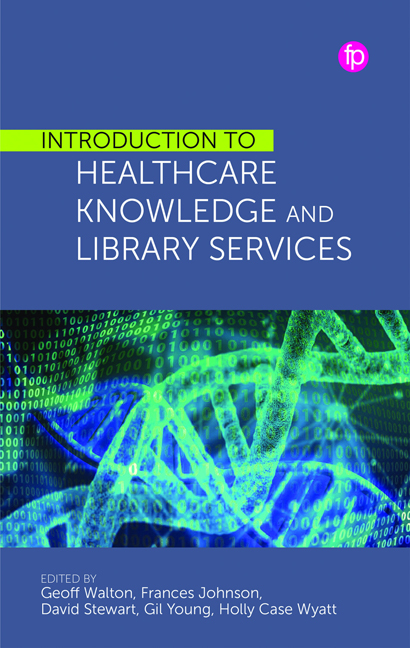Book contents
- Frontmatter
- Contents
- Figures, Tables and Case Studies
- Notes on Contributors
- Foreword
- How to Use this Book
- 1 An Introduction to Healthcare Knowledge and Library Services
- 2 Strategic Development for Healthcare Knowledge and Library Services
- 3 Exploring the Training and Development Needs of the Healthcare Knowledge and Library Services Workforce: A Case Study
- 4 Advocacy and How Knowledge and Library Specialists Tailor Services to Meet the Needs of Their Stakeholders
- 5 Mobilising Evidence and Knowledge
- 6 Internal and External Partnerships
- 7 Health Literacy, Patient Information and Combating Misinformation
- 8 Resource Discovery and Open Access
- 9 Growing the Evidence Base in Healthcare Knowledge and Library Services
- 10 Measuring Progress, Value and Impact in NHS Knowledge and Library Services
- 11 Reflective Practice in Healthcare Settings
- 12 Looking to the Future of Healthcare Knowledge Services
- Index
1 - An Introduction to Healthcare Knowledge and Library Services
Published online by Cambridge University Press: 22 February 2024
- Frontmatter
- Contents
- Figures, Tables and Case Studies
- Notes on Contributors
- Foreword
- How to Use this Book
- 1 An Introduction to Healthcare Knowledge and Library Services
- 2 Strategic Development for Healthcare Knowledge and Library Services
- 3 Exploring the Training and Development Needs of the Healthcare Knowledge and Library Services Workforce: A Case Study
- 4 Advocacy and How Knowledge and Library Specialists Tailor Services to Meet the Needs of Their Stakeholders
- 5 Mobilising Evidence and Knowledge
- 6 Internal and External Partnerships
- 7 Health Literacy, Patient Information and Combating Misinformation
- 8 Resource Discovery and Open Access
- 9 Growing the Evidence Base in Healthcare Knowledge and Library Services
- 10 Measuring Progress, Value and Impact in NHS Knowledge and Library Services
- 11 Reflective Practice in Healthcare Settings
- 12 Looking to the Future of Healthcare Knowledge Services
- Index
Summary
Introduction
Working in a health organisation can be a bewildering experience for new knowledge and library service (KLS) staff. Such organisations often have thousands of highly pressured clinical and managerial staff spread across multiple sites, with little time to explain how things work and what all the jargon means.
The good news is that, as a knowledge and library professional, you are already equipped to do lots of finding out for yourself:
• Start digging, start a set of notes, start a glossary or a set of questions.
• If it helps, draw up organisational and staff structures. A visual representation works better for some people.
• Network with knowledge and library colleagues in other health care organisations.
Our experience shows that these come in useful when you, in turn, are helping new staff understand the complex world they have just joined. One of the authors of this chapter used their diagram of the English National Health Service (NHS) as part of the induction for a finance director who had come from a non-health background, earning his gratitude and a friendly smile ever after.
This chapter will help you structure your voyage of discovery as you work out what your new organisation is all about and how it fits into the wider healthcare system of your country. It will also get you thinking about health in its wider societal context.
As we write, the COVID pandemic is an example of a worldwide issue, affecting every person in every country. Knowledge and library specialists play an important role in enabling fellow health staff, the public, patients, families and carers locate and, crucially, use high quality knowledge resources. The services provided by healthcare knowledge and library services ‘take the “heavy lifting” out of getting evidence into practice and give the “gift of time” to healthcare professionals’ (Economics by Design, 2020).
A word on terminology before we get started. We will generally use knowledge and library specialist to mean a person qualified in librarianship to at least degree level, or someone who aspires to be. This term covers a broad spectrum of roles across healthcare including, but not limited to, librarian, information professional and knowledge specialist. Most of our examples will come from the NHS but we believe you will be able to take the questions we think you should ask, find the answers and then apply them in your own home setting.
- Type
- Chapter
- Information
- Publisher: FacetPrint publication year: 2024



